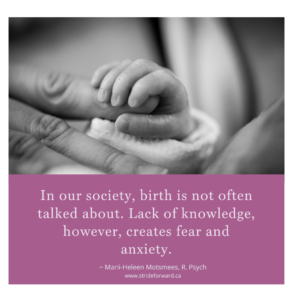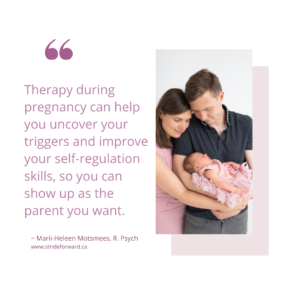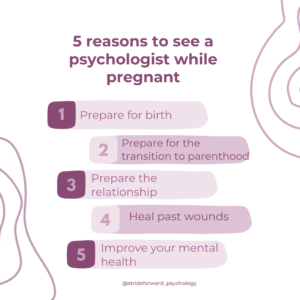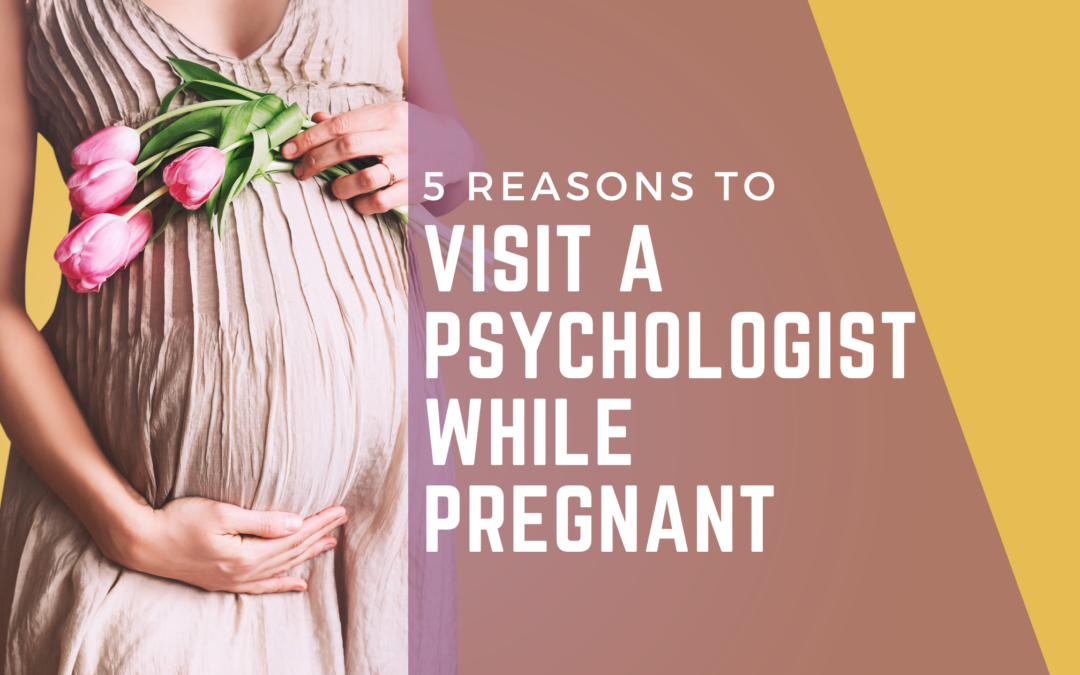Awareness around postpartum mental health has increased, but it’s equally important to talk about why parents-to-be should see a psychologist during pregnancy.
Mental health is often overlooked during pregnancy as the focus is on the physical health of the birthing person and the preparation for the baby’s arrival. However, it’s important to take care of both the physical and emotional well-being of future moms and dads.
Here are five reasons why seeing a perinatal mental health psychologist during pregnancy is a great idea:
1. To prepare for the birth
 In our society, birth is not often talked about. Lack of knowledge, however, creates fear and anxiety.
In our society, birth is not often talked about. Lack of knowledge, however, creates fear and anxiety.
Working with a psychologist, who specializes in perinatal mental health, can help you work through your worries around birth, teach you relaxation tools, and empower you to feel in control of your birthing experience.
2. To prepare for the transition to parenthood
Many aspects of parents’ lives will change after the baby is born, yet many feel unprepared for the magnitude of the shift.
New parents are vulnerable to mental health problems, especially when sleep deprivation, worry about the baby, feelings of inadequacy around parenting, and doubts about the ability to cope with this new phase of life arise.
Seeking therapy during pregnancy can help ease some of these problems by discussing sleep plans for both parents, addressing limiting beliefs, adding new coping skills to the parents-to-be toolbox, and addressing any worries that they might have.
3. To prepare the relationship
Research shows that two-thirds of parents experience a significant decline in relationship satisfaction within the first three years after their child is born.
Many factors that impact the relationship are unavoidable. Like less one-on-one time, hormonal and physical changes, and shifted priorities.
However, seeing a therapist during pregnancy can prepare the relationship for future challenges. With the support of a psychologist, partners can improve communication skills, and align their values and parenting styles. It is also important to talk through the day-to-day chore division after the baby arrives.
 4. To heal past wounds
4. To heal past wounds
Most of us have wounds from our childhood or early adulthood that we try to bury or minimize.
However, these past hurts can affect how you show up as a parent when you have not “done the work.”
Therapy during pregnancy can help you uncover your triggers, improve your self-regulation skills, and resolve self-defeating beliefs, so you can show up as the parent you want.
5. To improve your mental health
Around 60% of perinatal mental health problems start in pregnancy, and both parents, not just the birthing person, can develop the symptoms. Research has shown that postpartum mood and anxiety disorders are temporary and treatable with professional help. However, early signs are often missed.
Seeking therapy during pregnancy can help you take proactive steps to improve your mental health and well-being. By learning about the symptoms of postpartum mood and anxiety disorders and discovering ways to take care of your emotional well-being, you can prepare yourself for any challenge that may arise. In addition, your therapist can help you put together an action plan that will ensure you receive the help you deserve if any of the symptoms should develop.
If you are already experiencing depression or anxiety, a therapist can help you learn new ways to manage your symptoms so that you can enjoy your baby and the new phase of your life.
Prepare for mental wellness
 Pregnancy is a time of preparation. Preparing your mental health can help you:
Pregnancy is a time of preparation. Preparing your mental health can help you:
- reduce the fears about and empower you for the birth experience
- transition successfully to parenthood
- build a stronger and more resilient relationship before the baby arrives
- work through past wounds to become the parent you want to be
- take proactive steps towards better mental health


